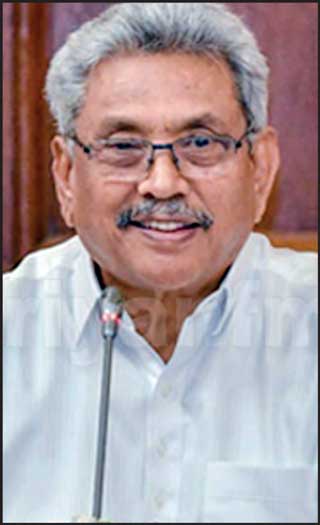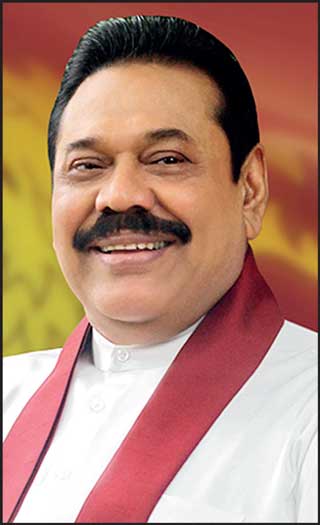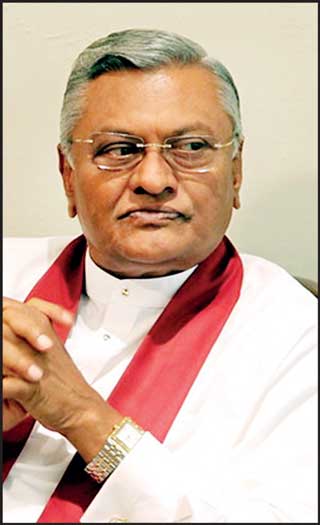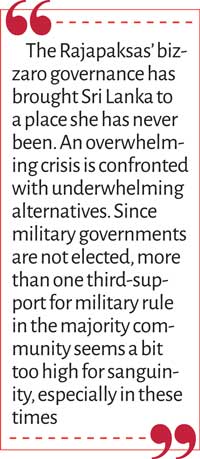Thursday Feb 12, 2026
Thursday Feb 12, 2026
Wednesday, 2 March 2022 00:25 - - {{hitsCtrl.values.hits}}
“The cause of foreign exchange crisis is not my fault or th fault of the government.”
– President Gotabaya Rajapaksa (Speech on 26 Feb. 2022)
By Tisaranee Gunasekara
Noam Chomsky coined a term to explain the US’s obsession with Cuba, Mafia doctrine: “The Godfather
 |
| President Gotabaya Rajapaksa |
 |
| Prime Minister Mahinda Rajapaksa |
 |
| Minister Chamal Rajapaksa |
does not tolerate disobedience” (Hopes and Prospects). Give respect, or you are punished.
Today, what Professor Chomsky called, ‘an underappreciated principle of international order,’ is at play in Vladimir Putin’s thuggish onslaught on Ukraine. If President Putin stayed his forces on the borders of Luhansk and Donetsk, the two ‘republics’ he carved out of Ukraine, his actions might have fallen within that other American construct, Monroe doctrine. Instead, he is trying to subjugate Ukraine totally, to teach this weaker neighbour, and everyone else by extension, a lesson in obedience.
Vladimir Putin’s invasion of Ukraine is no different from George W. Bush’s invasion of Iraq. Most who condemned Saddam Hussein’s tyrannical rule also opposed the invasion, despite attempts by Mr. Bush’s neo-con enablers to conflate the two. Like that disastrous venture, Mr. Putin’s invasion too will change the world for worse. Ultra-nationalist forces on both sides will be strengthened. A new arms race will be born, consuming resources that should have, might have, been spent on vital social welfare and climate protection measures.
The West’s culpability in the unfolding tragedy is unarguable. NATO should have ceased to exist when its raison d’être vanished with the disintegration of the Soviet Union. A new Marshall Plan should have been launched for the former Warsaw bloc countries, including Russia and the ex-Soviet republics. One of the most pernicious outcomes of that strategic failure was the rapid rise of ethno-religious populism, including paramilitary neo-Nazi movements like the Azov Battalion in Ukraine and RNU in Russia. Had the post-Soviet East gone the way of the post-war West, even a President Putin could have been avoided.
Ukraine too contributed to her own tragedy by embracing ultra-nationalism and marginalising the minorities. Ukraine had its Sinhala Only moment even before it gained full independence. In 1989, a law was passed making Ukrainian the only official language. This law was amended in 1991 making Russian a link language and allowing more space for other minority languages. But the seeds of minority fear and discontent had been sown.
Three more language laws were introduced after the 2014 upheavals. The law on education restricting the use of minority languages in educational establishments was so discriminatory it drew serious protests from Hungary, Poland, Slovakia, and Bulgaria and has been deferred implementation until 2023. These disastrous ventures helped provide an opening to President Putin when he embarked on his Make Russia Great Again path.
In the late 18th and 19th Centuries, Ukrainians were belittled as little Russians (Malorusy) as distinct from true or great Russians (Velikorusy) and Ukrainian language dismissed as a Russian dialect. In July 2021, President Putin wrote a 5,000-word essay, tellingly titled ‘On the historical unity of Russians and Ukrainians’. Even more tellingly, in his late-night TV address of 23 February 2022, he blamed the Bolsheviks (specifically Lenin) for artificially creating Ukraine “in a way that was extremely harsh on Russia” and berated Stalin and Khrushchev for giving more ‘Russian land’ to Ukraine. Putin’s ambitions are demonstrably revanchist, a modern recreation of the Czarist Empire. His model is not Bolsheviks but Romanovs. If he wins, the only future Ukraine can expect is that of a vassal state. Fortunately, the possibility of his forces getting bogged down in Ukraine is real.
Perhaps Putin regarded his thuggish assault on Ukraine as a way of bolstering his popularity. He obviously didn’t expect tens of thousands of ordinary Russians to come out onto the streets in Moscow and across the country protesting the war. As Senator Bernie Sanders said, “In an authoritarian country like Russia, protest is an act of enormous courage.” Thousands have been arrested, yet protests continue. The Getty image of 23 February of a lone woman in Moscow holding a placard reading No to war with Ukraine (in Russian) as a uniformed policeman photographs her on his phone is symbolic of Russia’s growing resistance to Vladimir Putin’s madness.
Ukraine (in Russian) as a uniformed policeman photographs her on his phone is symbolic of Russia’s growing resistance to Vladimir Putin’s madness.
Early this year, the IMF downgraded its global growth prospects. The Ukrainian crisis is likely to dampen global economic prospects still further, and make whatever growth that happens more iniquitous. In Sri Lanka, the Ukrainian crisis will give the Rajapaksas another excuse to explain away the devastating effects of their bizzaro governance.
Losing the present
“There has never been an age like this when the entire country was being equally developed,” claimed Prime Minister Mahinda Rajapaksa last week in Katuwana.
The same week, power cuts were extended beyond five hours, everything from fuel and milk to gas and Panadol became scarce, about half of private buses stopped running due to lack of diesel, bakery owners warned of imminent shortages, pharmacists said that their stocks would last only three months, and the Governor of the Central Bank officially proposed a four-day week as a solution to the fuel crisis.
In the latest LMD opinion poll, most respondents identified the economy, COVID-19, and poverty as three most important national issues. This tallies with the findings of a broader opinion poll by the CPA, in which most Lankans named, COVID-19, cost of living, and economic growth as their main priorities.
The Rajapaksas’ words and deeds indicate that they are clueless both about the crisis and a way out. “Wouldn’t a kilo of rice be enough for two people for a week?” Minister Chamal asked this week. Ignorance, denial, scapegoating, and comically underwhelming proposals seem to be their sole response. For example, one ‘solution’ to the fuel crisis, agreed in the cabinet, is ‘promotion of non-motorised transport’ – build bicycle lanes, encourage government employees to use cycles to commute to work, and improve parking and access to office cyclists. Talk about staunching a flood with a single straw.
In January, foreign remittances plummeted by 61.6% compared to the previous year, a direct result of a totally unrealistic exchange rate. The regime’s main solution to the forex-crisis is to sell whatever real estate to anyone with dollars, and to hell with the consequences. Take, for example, the resuscitation of a 2013-proposal to sell 65,000 acres in Rideemaliyadda to Singapore’s Gazelle Ventures for sugar production. The land is in the ancient Bintenna, the heart of Vedda territory, with massive biodiversity and several archaeological sites. If the sale goes ahead, many adivasis will lose their homes and a massive environmental devastation will result, worsening water-shortages and human-elephant conflict.
production. The land is in the ancient Bintenna, the heart of Vedda territory, with massive biodiversity and several archaeological sites. If the sale goes ahead, many adivasis will lose their homes and a massive environmental devastation will result, worsening water-shortages and human-elephant conflict.
Economic sanity seems to be the rarest of commodities in Rajapaksa Sri Lanka. While decapitating the State’s revenue base with its irrational tax cuts, the Gotabaya-Mahinda-Basil regime added another prong to the future fiscal crisis by providing government employment to unemployed graduates and those who failed Ordinary levels. According to media reports, many of the graduates are being sent to district and divisional secretariats as Grade III development officers. The sudden influx is reportedly creating a glut, with too many officers chasing too few tasks, not to mention desks and chairs. Some of the O/L failed recruits are being employed as office assistants in State institutions, with similar confusion.
According to official provisional estimates the financial loss from that bizarre attempt to turn Lankan agriculture from non-organic to organic in one season was a massive $ 1.04 billion (Sunday Times – 30.1.2022). The FAO’s Global Information and Early Warning System, as prices soar, people are eating less or shifting to less nutritious alternatives. Last week, a father in Welipenna took his own life, unable to bear the sight of his hungry children.
In the meantime, the Government is busy with important matters. Such as abolishing State ministries, recreating them, playing around with their powers and functions, promoting water sports, building luxury apartment complexes... According to a pro-government website, the drama about the milk-powder queue on the president’s road to work continues, with the latest episode consisting of an order to issue milk powder only between 6:30 and 8:30 in the morning. An attempt is reportedly being made to blame the Easter Sunday massacre on former CIA director Shani Abeyekara and to arrest him under the PTA. A piece plugging that argument in a Sinhala nationalist paper hinted at the former top sleuth’s real crime. The previous government suffered from Gota-fear, the article claimed; Shani Abeysekara and the CID targeted Gotabaya Rajapaksa. Lèse-majéste!
Little wonder that people are losing hope. According to the CPA survey, only 30% of Lankans have confidence in the Government’s ability to regenerate the economy (4.9% very likely, 26.1% somewhat likely). No amount of propaganda can deceive people about the state of their own wallets and their own stomachs.
Though economy is the top national concern, a parliamentary debate on the state of the economy had to be cancelled because of a lack of a quorum. The absentees included government and SJB members. Rhetoric aside, indifference seems to be a bipartisan malady.
Imagining the future
November 1942; Hitler’s armies ruled most of Europe; the Soviet Union was still fighting alone; the second front was only talk. In an encircled and isolated UK, a report about the shape of a post-war UK was issued and became an instant bestseller. Sir William Beveridge’s report contained a detailed blueprint for the future, including a national health service, adequate state pensions, family allowances and employment generation. That report, prepared at a dark time, became the foundation of Britain’s welfare state.
second front was only talk. In an encircled and isolated UK, a report about the shape of a post-war UK was issued and became an instant bestseller. Sir William Beveridge’s report contained a detailed blueprint for the future, including a national health service, adequate state pensions, family allowances and employment generation. That report, prepared at a dark time, became the foundation of Britain’s welfare state.
Not placing the cost of recovery on the already bent backs of the ordinary people, to raise the necessary resources by taxing the rich, was a conscious choice many European nations made, post-war. It is important to remember that this ambitious program of human development was implemented in a war-devastated continent. The cost was massive, yet politicians of every persuasion agreed about its necessity. In Postwar, Tony Judt says that societies were willing to shoulder this massive expenditure “when life was still truly hard and material shortages endemic...precisely because times were difficult.”
The far-reaching welfare measures (funded mostly by a swathe of progressive taxes) were “a first step away from the hopelessness and cynicism of the pre-war years.” Or in the words attributed to arch-cold-warrior General Lucius Clay, “There is no choice between being a communist on 1500 calories a day and a believer in democracy on a thousand.” Building democracy needed a measure of economic justice; cart and horse.
Will the Opposition be willing to make use of the growing global consensus (based on empirical evidence) about the necessity of progressive taxation? As an IMF document stated, “For years politicians and economists alike have been arguing that higher taxes for the top 1% earners, as tax theory suggest there should be, would be bad for growth… Empirical results do not support this argument, at least for levels of progressivity that are not excessive… Conclusion: Higher taxes for the rich will reduce inequality without hitting growth. Now it seems that it’s time for the politicians to start translating this into policy as soon as possible” (IMF Fiscal Monitor). Is our Opposition willing to face the challenge of angering their funders to help their voters survive?
An ancient Chinese musical treatise quoted in Joseph Campbell’s Primitive Mythology: The Masks of God, identifies five calamities that can befall a country: Disorganisation - when the Prince is arrogant; Deviation – when officials are corrupt; Anxiety – when people are unhappy; Complaint – when – public services are too onerous; Danger – when resources are lacking. Sri Lanka seems to be beset by all five. If the opposition fails to come up with an accurate analysis of the crisis and a credible path out of it, the populace, in their desperation, might look elsewhere.
According to the CPA survey, aptly titled, Confidence in Democratic Governance Index, an absolute majority of 52.9% Sinhalese are very satisfied with the military’s increasing footprint in civilian sectors and 37% are somewhat satisfied. While only 36.3% of Sinhalese strongly or somewhat agree about the desirability of a military government, this still seems too high a figure, especially given the fact 79.1% of Sinhalese agree about the desirability of a strong leader who does not have to be inconvenienced by elections.
An even more worrying fact is that an absolute majority of 59.6% Sinhalese strongly agree about the desirability of such a leader. Take this together with the fact that only 29.9% of Sinhalese want more power to be taken from parliament and given to the president while a much higher 42% of Sinhalese want more power to be taken from the president and given to parliament, and the composite picture is one of considerable confusion. Most Sinhalese might desire an untrammelled leader out of confusion rather than conviction based on reason and knowledge. But such confusions have historically aided not democracy but its opposite.
The Rajapaksas’ bizzaro governance has brought Sri Lanka to a place she has never been. An overwhelming crisis is confronted with underwhelming alternatives. Since military governments are not elected, more than one third-support for military rule in the majority community seems a bit too high for sanguinity, especially in these times.
After all, Sri Lanka does not have what is called ‘a deep experience of democratic rule,’ even of the flawed variety. What we have is an ontological memory of being ruled by a man in a crown, at the head of an army.